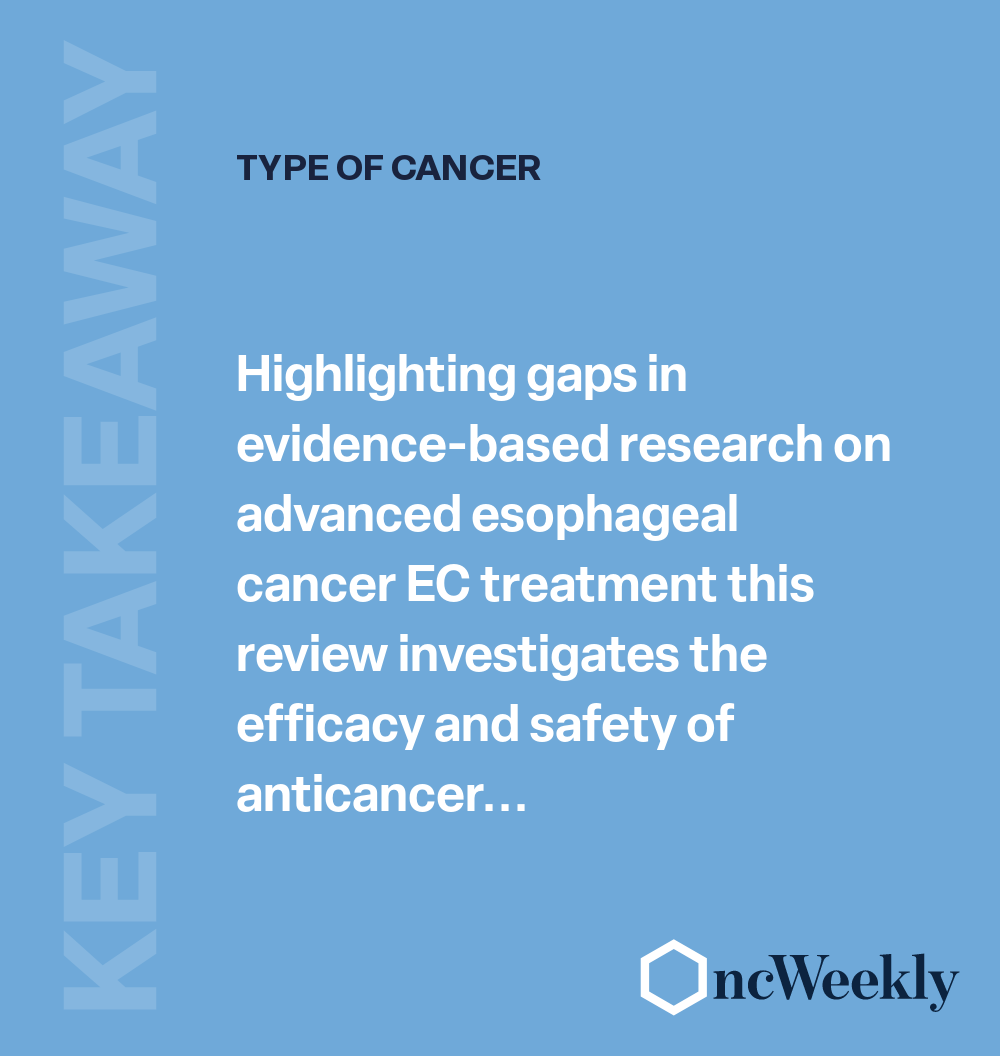KEY TAKEAWAYS
- The study aimed to compare the efficacy and safety of anticancer drugs vs supportive care in advanced EC.
- Researchers found low certainty in RCTs about anticancer drugs’ benefits over supportive care, underscoring the need for better trials.
Highlighting gaps in evidence-based research on advanced esophageal cancer (EC) treatment, this review investigates the efficacy and safety of anticancer drugs versus supportive care.
Marilina Santero and the team aimed to evaluate current treatment approaches and identify critical research gaps needing further exploration.
They performed an inclusive analysis of RCTs comparing anticancer drugs (chemotherapy, immunotherapy, or biological/targeted therapy) with supportive care in advanced EC. Searches conducted in May 2022 across MEDLINE, EMBASE, the Cochrane Central Register of Controlled Trials (CENTRAL), Epistemonikos, and trial registries (ClinicalTrials.gov and PROSPERO) identified relevant studies. The results were summarized using GRADE summary of findings tables to assess the quality of evidence and treatment efficacy.
A total of 15 RCTs were included in the review. Many of these studies lacked a specific focus on EC, failed to detail treatment lines for all patients, and did not assess all relevant outcomes. Anticancer drugs might lead to a modest increase in overall survival (OS) (HR 0.78; 95% CI 0.71, 0.86; MD 0.83 months) and improved progression-free survival (PFS) (HR 0.56; 95% CI 0.49, 0.64; MD 0.68 months), but could also result in higher toxicity (RR 1.37; 95% CI 1.13, 1.65) without significantly enhancing the quality of life. The certainty of evidence was rated low or very low due to the indirectness of results and the lack of specific focus on EC in some studies.
The study concluded that RCTs on advanced EC suffer from a lack of specificity, detailed treatment line information, and comprehensive evaluation of relevant outcomes. Any identified benefits of anticancer drugs are minimal.
Consequently, the certainty of justifying anticancer drug treatments over supportive care in advanced EC remains low or very low, underscoring the need to share this information with patients. Future research should focus on conducting more rigorous RCTs to determine if any current or novel treatments offer a better balance of benefits and harms compared to supportive care.
This study has been funded by Instituto de Salud Carlos III through the project “PI18/00034” (Co-funded by the European Regional Development Fund “A way to make Europe”). Marilina Santero is funded by Instituto de Salud Carlos III through the contract “FI19/00335” (Co-funded by the European Social Fund “Investing in your future”).
Source: https://pubmed.ncbi.nlm.nih.gov/39026378/
Santero M, Meade AG, Selva A, et al. (2024); Appropriateness of Systemic Oncological Treatments for Advanced Cancer (ASTAC-Study) Research Group. “Utilising systematic reviews to assess potential overtreatment and claim for better evidence-based research: an analysis of anticancer drugs versus supportive care in advanced esophageal cancer.” Syst Rev. 2024 Jul 18;13(1):186. doi: 10.1186/s13643-024-02594-1. PMID: 39026378; PMCID: PMC11256491.




